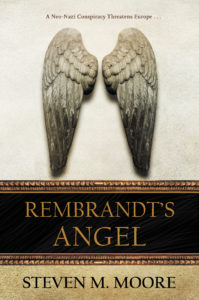Anthologies and collections…
They don’t sell well. That’s not just my perception. I’ve stopped publishing my own short fiction collections. I’m giving away a companion volume to Pasodobles in a Quantum Stringscape, which was published six years ago and is now one of my “evergreen books” (books that are as current in plots and themes as they were when I wrote them). You can download Volume Two as a free PDF—see the list on the “Free Stuff & Contests” web page at this website. I’m preparing Volume Three, which will also be a free download.
I’ve participated in a few anthologies too—World Enough and Crime is an example. FYI: If the other subject matter or the theme of the anthology correlates well with my story, I’ll rarely turn down an invitation. That might also increase the chances my story will sell a bit better than a collection dedicated to just one author’s stories. I’d need more stats to prove that, though. For now, being a pessimistic guy about publishing in general and authors’ success in particular, I’m sticking with the assumption that neither collections nor anthologies sell well.
If true, isn’t it odd that it is? Someone on a long commute via bus or train can probably zip through a short story and get through most of a novella on their smart phone instead prefers to catch up on social media where “friends” and ‘followers” are often faceless e-acquaintances (I haven’t had the experience of contacting someone with one user’s name only to find that I’ve had contact with her or him where another name is used, but I know people who have). Or they participate in a silly video game where the sound effects annoy everyone else around them. Short fiction also suffers the same fate as novels—there are fewer readers every day that passes because there are too many other distractions available where people don’t have to use their minds.
When people do read—rare these days—they often prefer a novel to short fiction. There’s more demand for novels than short stories. Some of that lost demand for short fiction once rested in the domain of ‘zines, online or old paper standbys. They’re in trouble, so a vicious circle is created. Fewer ‘zines means fewer places for authors to publish short fiction. And the ‘zines left have become incestuous old boys’ clubs.
Of course, they always have been. Consider Campbell’s Astounding Science Fiction—yes, he basically ran it tyrannically as his own personal fiefdom. For years, this irascible and cantankerous personality played favorites. Because he was also a racist and a bigot, the ‘zine has recently changed the name of the John Campbell Award to something more neutral. The ‘zine is still an incestuous old boys’ club, though, as are most ‘zines. Knowing this and the pittance of royalties they pay, no author in his right mind should submit short fiction to one of them until s/he is completely sure they’re open to publishing new voices. I just don’t waste my time with them anymore, and that time was often akin to what I spend for a full novel!
The best anthologies have a theme. Even better, they’re associated with a good cause. I have my causes—who doesn’t? (see the list on my “About the Author” web page)—so if you feel like paying me some royalties for your free PDF downloads, donate to one of them…or one of your choice. (They’re getting killed by the new tax laws, by the way.) Or here’s one that might grab you: Once Upon a Wolfpack, published by the #WolfPackAuthors group, is an excellent anthology of short fiction and poetry, and all its royalties go to the Lockwood Animal Rescue Center’s Wolves and Warriors program. “What’s that?” you ask. By purchasing this anthology, you are supporting not only veterans but the wolves of North America, both endangered in a sense—PTSD attacks veterans, many of them wounded both physically and mentally; wolves are attacked and killed by ranchers and trophy hunters. LARC employs the veterans who take care of the wolves. By buying this anthology, you will receive some quality entertainment, help anthologies survive, and help LARC do its important work.
I’m a fan of short fiction—always have been. When I start a story, I never know whether it will be a short story, novella, or novel. When I was a kid, I read a lot of short fiction—even Astounding. A short story can be as meaningful as a novel. Today it just doesn’t sell well, and that’s a shame. Readers can change that.
***
Comments are always welcome!

Son of Thunder. #2 in the “Esther Brookstone Art Detective Series.” This sequel to Rembrandt’s Angel has Esther Brookstone, now retired from Scotland Yard, obsessed with finding St. John the Divine’s tomb, using directions left by the Renaissance artist Sandro Botticelli. The disciple’s missionary travels and Botticelli’s trip to the Middle East make for three travel stories that all come together. Esther’s boyfriend, Interpol agent Bastiann van Coevorden, has problems with arms dealers, but he multitasks by trying to keep Esther focused and out of danger. The reader can also learn how their romance progresses. History, archaeology, romance, and art make for a tasty stew in this mystery/thriller novel soon to be published by Penmore Press in print and ebook formats. While it can be read independently of the first book, you can learn more about Esther and Bastiann in Rembrandt’s Angel—available in print and ebook formats at Amazon and in ebook format at Smashwords and the latter’s affiliated retailers (iBooks, B&N, Kobo, etc.) and lenders (Overdrive, etc.).
Around the world and to the stars! In libris libertas!
